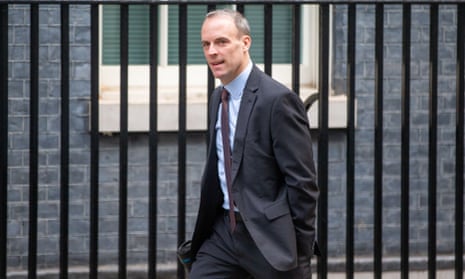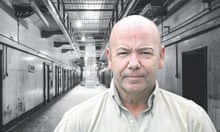Plans to overhaul the Human Rights Act are a blatant power grab with the aim of putting the government above the reach of the law, pressure groups and opposition parties have said.
Launching a three-month consultation on a new bill of rights in the Commons, Dominic Raab faced a number of calls to row back on plans to strengthen the power of the state against the rights of the individual.
The highly controversial changes will introduce a permission stage to “deter spurious human rights claims” and alter the balance between freedom of expression and privacy.
Martha Spurrier, the director of the human rights group Liberty, said: “This plan to reform the Human Rights Act is a blatant, unashamed power grab from a government that wants to put themselves above the law. They are quite literally rewriting the rules in their favour so they become untouchable.”
Sacha Deshmukh, the chief executive of Amnesty International, said human rights were not “sweets” ministers could pick and choose from and the “aggressive” attempt to “roll back” the laws needed to be stopped.
He added: “If ministers move ahead with plans to water down the Human Rights Act and override judgments with which they disagree, they risk aligning themselves with authoritarian regimes around the world.”
The Law Society of England and Wales president, I Stephanie Boyce, said: “People from all walks of life rely on the Human Rights Act to uphold and protect their rights. Any reform of this subtle and carefully crafted legal instrument should be led by evidence – not driven by political rhetoric.”
Raab told MPs Britain would remain a party to the European convention on human rights (ECHR) before outlining how it wants to change, reform and revise the domestic interpretation and application of the convention by the UK courts.
“Following the reforms to the convention system reflected in the 2012 Brighton declaration, we will assert the margin of appreciation as appropriate in the UK’s dialogue with the Strasbourg court,” he said.
Raab said the UK government wanted to “prevent the misuse and the distortion” of the convention, noting: “Some of this has arisen because of the Strasbourg case law and some from the UK case law.
“Let me just be very clear at the outset: my critique is levelled at the Human Rights Act, the way it operates – it’s not levelled at the UK judiciary, who have quite properly sought to implement legislation passed in this house.”
Q&AWhat is the Human Rights Act?
Show
The Human Rights Act 1998, which came into force in 2000, enshrines into UK law the rights contained in the European convention on human rights (ECHR).
Drafted in 1950, the ECHR outlines these fundamental principles:
- The right to life.
- Prohibition of torture.
- Prohibition of slavery, servitude and forced labour.
- The right to liberty and security of person.
- The right to a fair trial.
- Prohibition of the retroactive criminalisation of acts.
- A right to respect for one's "private and family life, home and correspondence".
- A right to freedom of thought, conscience and religion.
- The right to freedom of expression.
- The right to freedom of assembly and association.
- The right to marry.
- Freedom from discrimination.
It provides that British judges should hear cases in such a way that they are compatible with the findings of the European court of human rights in Strasbourg where possible. It also makes it unlawful for public bodies to act in ways that are incompatible with the convention.
The shadow justice secretary, Steve Reed, called the plans a “dead cat distraction tactic”.
“Every time the government’s in trouble politically they wheel out reforming the Human Rights Act,” he said. “It’s a dead cat distraction tactic by a government that doesn’t know how to fix the criminal justice system that they’ve broken and is desperate to divert attention away from the corruption scandals they started.
“This is little more than an attempt to wage culture wars because they’ve surrendered from waging war on crime and corruption.”
MPs heard that Boris Johnson was leading a party of “growing authoritarianism”.
Clive Lewis, the Labour MP for Norwich South, said if parliament was playing “authoritarian bingo” then Raab’s statement had achieved a full house. “Not only have you come for our trade union rights, our rights to vote, our rights to protest – our human rights now are up for grabs. Today’s statement does nothing to strengthen human rights, it does everything to weaken them.”
Brendan O’Hara, the Scottish National party’s human rights spokesperson, called on the government to provide evidence for the need for an overhaul of human rights law.
Raab replied that the evidence base had been set out “at some length”, adding that a new interpretation of article 8 on the right to private and family life “will allow us to deport more foreign national offenders, which has been hamstrung … under the Human Rights Act”.
Raab said the proposals would also reinforce the weight given to freedom of speech, adding it was “a quintessentially British right, the freedom that guards all the others. But one which we have seen eroded of late by a combination of case law introducing continental-style privacy rules and the incremental narrowing of the scope for respectful but rambunctious debate in politically sensitive areas.
“Freedom of speech does sometimes mean the freedom to say things which others may not wish to hear.”
Raab said the changes would “sharpen” the separation of powers and make the UK supreme court, not Strasbourg, the “ultimate judicial arbiter when it comes to interpreting the ECHR in this country”.
The justice secretary said of the UK’s proposals: “We can prevent serious criminals from relying on article 8 – the right to a family life – to frustrate their deportation from this country.” Raab said article 8 claims made up “around 70%” of all successful human rights challenges by foreign national offenders against deportation orders, adding: “Our proposals would enable us to legislate to curtail that abuse of the system.”
He said the changes would also help the government deliver its “root-and-branch reform” of parole proceedings, noting this had been raised by MPs from all sides in the aftermath of cases including that of Colin Pitchfork, a double child killer who was recalled to prison in November after approaching young women while on probation.
“In these areas and others our reforms will enable parliament to act and where necessary assert the margin of appreciation with respect to Strasbourg whilst remaining party to the convention,” said Raab.










